The numerous benefits of blackcurrants are gaining the attention of many researchers. These berries are a rich source of antioxidants. They also possess anti-diabetic, anticancer, and antispasmodic properties.
Research also states that these berries can combat many viral infections and boosts memory. There is an array of benefits they offer for the eyes and skin too. In the article below, you will find out how blackcurrants help in managing acute and chronic conditions as well. Also, have a look at the science behind the benefits. Scroll down to know more!
In This Article
Blackcurrants: In brief
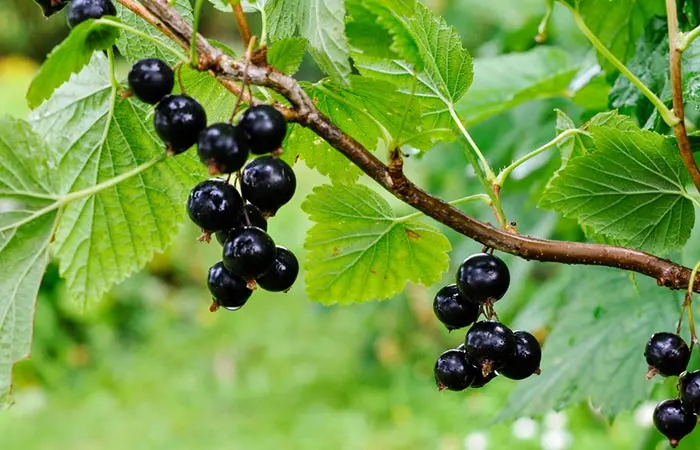
Shutterstock
Blackcurrants (Ribes nigrum L.) are small, black, berry-like fruits native to central Europe and northern Asia. Today, they are cultivated in parts of the world with a temperate climate (1).
The fruits are rich in vitamin C, organic acids, and essential oils besides the other micro and macronutrients. Hence, they taste acidic but sweet. Moreover, they have phenolic compounds with antioxidant and antimicrobial properties (1).
The leaves of blackcurrants contain unique quercetin derivatives. These active molecules also contribute to the anti-inflammatory, antiviral, and antiseptic effects (1).
Traditional medicine uses its extracts to manage a variety of disorders, including cancer. Today, there is a volume of clinical studies that show positive effects of blackcurrants on heart, brain, and kidney diseases (1), (2).
In the following sections, you’d find the evidence supporting the benefits of these fruits. You’d also get to know how to eat them and about their safety.
Scroll down and enjoy reading!
What Are The Benefits Of Blackcurrants?
Blackcurrants can protect your digestive, circulatory, nervous, and excretory systems. These fruits have been extensively studied for their anticancer properties.
1. Have Anti-inflammatory Effects
Inflammation may cause heart, liver, and kidney diseases. It may also induce arthritis, urinary tract infections (UTIs), and neurodegenerative disorders (Alzheimer’s disease, dementia, etc.). Including foods rich in anti-inflammatory compounds in your diet can prevent/reduce the severity of this phenomenon.
Anthocyanins are a class of polyphenols predominantly found in blackcurrants. Blackcurrant extracts suppress the activation of pro-inflammatory components in your immune system (3).
These molecules target specialized cells like macrophages. This prevents several inflammatory disorders from worsening (4).
2. Soothe The Stomach And Aid Digestion
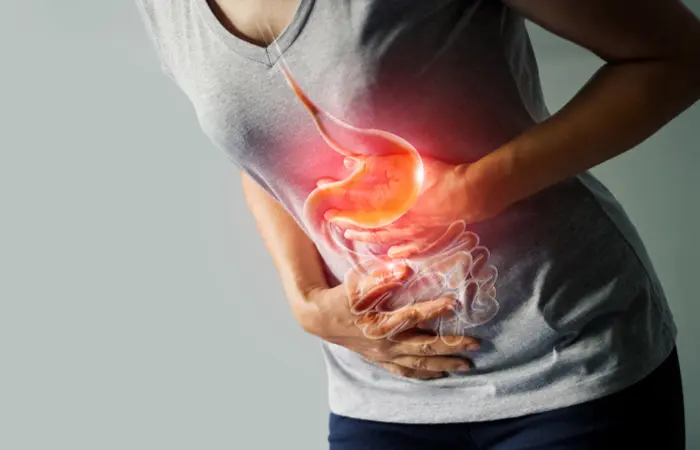
Shutterstock
These berries are abundant in flavonoids. These phytochemicals have been shown to cause smooth muscle relaxation. Blackcurrant extracts could relax contractions in the GI tract, according to animal studies (5).
Studies confirm the antispasmodic activity of these fruits. Quercetin, myricetin, and other flavonoids inhibit spasms in the stomach and intestines. Also, blackcurrant leaves have been used in folk medicine to treat diarrhea (6).
3. Boost Kidney Health
The antioxidant and anti-inflammatory effects of blackcurrants prevent chronic kidney disorders. They protect your excretory system from inflammation and infections. The extracts also inhibit the formation of kidney stones (7).
Blackcurrant juice/tea makes your urine more alkaline (increases its pH). It also promotes the excretion of excess citric acid and oxalic acid from your body. If not, these two acids can react to form kidney stones when left to pile up (8).
A hundred grams of black currants has about 4.3mg of oxalate. That makes these fruits safe for individuals with kidney disorders and bladder stones (9).
4. Lower Blood Cholesterol Levels
High levels of LDL (bad) cholesterol elevate the risk of cardiovascular, liver, and other metabolic disorders. Research shows that diets rich in anthocyanins cause a decrease in total cholesterol and LDL levels. They also increase serum HDL (good) cholesterol levels (10).
Animal studies with blackcurrant extracts are supporting evidence to this effect. Subjects treated with this extract showed significantly lower cholesterol levels than the untreated/control ones (11).
Moreover, blackcurrant juices are abundant in antioxidants. These juices prevent the oxidation of lipids in your body (12). This way, they can prevent/delay the onset of obesity and chronic conditions like atherosclerosis and Alzheimer’s.
5. Have Antidiabetic Effects
Blackcurrant has anthocyanins like cyanidin 3-rutinoside, delphinidin 3-glucoside, and peonidin 3-rutinoside. When consumed in fair amounts, these phytochemicals improve insulin sensitivity, particularly in individuals with type 2 diabetes (13).
Carbohydrate-metabolizing enzymes (like α-Glucosidase and pancreatic α-amylase) are the targets of anthocyanins. They block the activity of these enzymes. As a result, the rapid breakdown of carbohydrates is slowed down. Ultimately, anthocyanins can prevent sudden spikes in your blood sugar/glucose levels (14).
6. May Help Manage Eye Disorders

Shutterstock
The black currant anthocyanins improve the functions of your eyes/vision. These molecules increase the blood flow in the optical nerves and eyes. Regular consumption of such foods and supplements may decelerate the loss of vision or related symptoms in patients with glaucoma (15).
Anthocyanins may have positive effects on chronic eye ailments. These include diabetic retinopathy, retinal vein occlusion, and retinal artery occlusion (15).
These active molecules are absorbed and transferred beyond the blood-retina barrier when taken orally. They reach various parts of the ocular tissues and preserve their function. Thus, blackcurrants or their extracts can slow down the effects of aging and disease on eyes (15).
7. Protect Your Brain
Like vitamin C, black currant extract inhibits lipid peroxidation in your body. Experimental studies report about 65% inhibition, thanks to its antioxidant capacity. This activity is most beneficial in protecting your central nervous system (CNS) (16), (17).
In the absence of this effect, free radicals accumulate in your system. Free radicals are known to trigger neurodegenerative diseases, including Alzheimer’s, Huntington’s, and Parkinson’s diseases (18).
Subscribe
Usually, the accumulation of free radicals leads to inflammation of the brain cells (neurons). Blackcurrants reduce neuroinflammation because they contain anti-inflammatory molecules. A cumulative effect of these properties causes improved memory, learning, and cognitive abilities (18).
8. May Promote Liver Health
Alcohol abuse causes permanent changes in the structure and function of liver cells. The proteins and phospholipids get structurally modified. This may have a direct effect on the liver’s functionality (19).
Another problem that stems from alcohol abuse is the formation of free radicals/reactive oxygen species (ROS). These ROS can react with phospholipids in the liver cell membranes and trigger inflammation (19).
Adding polyphenol-rich foods like blackcurrants to your diet can pause/stop such detrimental effects. Blackcurrants protect the structural lipids and proteins from the attack by ROS (19).
In several animal studies, the skins of these berries show anti-proliferative effects on cancerous liver cells (20).
9. Repair And Nourish Skin
Various skin diseases arise due to inflammation, infections, or aging. They leave you with dry skin, lesions, itching, redness, scabs, etc. Atopic dermatitis is an example of a serious skin condition seen in children and adults (21).
Your skin would need intense repairing and conditioning in such cases. Clinical studies discovered a specific polysaccharide in blackcurrants that exerts anti-inflammatory effects. This molecule controls the production of inflammatory compounds by your immune system (21).
Blackcurrant seeds contain good amounts of fatty acids, like linolenic acid. Their oil suppresses the inflammation mediators in your skin. So, blackcurrants and the seed oil can nourish and nurse your skin to health without any side effects (21), (22).
10. Possess Antimicrobial Properties
Recent studies have reported potent antiviral properties in the leaves of wild blackcurrants. Their extracts can particularly eliminate Influenza A viruses (IAV) that cause highly contagious human diseases. The typical symptoms of IAV infections are fever, sore throat, headache, muscle pain, and nasal inflammation (23).
The leaf extracts prevent the entry and internalization of these viruses at the molecular/genetic level. The essential oil of these leaves also has antibacterial and antifungal properties.
Active compounds like caryophyllene, sabinene, terpinolene, ocimene were identified in this oil. Escherichia coli, Streptococcus faecalis, Staphylococcus aureus, Candida albicans, and Trichophyton mentagrophytes are a few microbes susceptible to blackcurrant seed oil treatment (24).
Trivia
- By weight, black currants contain 3-4 times more vitamin C than oranges. The levels of antioxidants are twice that of blueberries (25).
- Blackcurrant and its derivatives are said to ease menstrual discomfort. Issues like PMS can be effectively treated with these products. However, there is not enough practical evidence supporting this application.
- Blackcurrant seed oil is known for its anti-inflammatory effects. It contains essential fatty acids that help in managing debilitating conditions like rheumatoid arthritis and morning joint stiffness (26).
It is equally important to know the nutrients responsible for these mind-blowing benefits. A powerful phytonutritional composition is the answer.
Jump to the next section for more information!
Nutritional Profile Of Blackcurrants
| Nutrient | Unit | 1 cup or 112 g |
|---|---|---|
| Proximates | ||
| Water | g | 91.8 |
| Energy | kcal | 71 |
| Energy | kJ | 296 |
| Protein | g | 1.57 |
| Total lipid (fat) | g | 0.46 |
| Ash | g | 0.96 |
| Carbohydrate, by difference | g | 17.23 |
| Minerals | ||
| Calcium, Ca | mg | 62 |
| Iron, Fe | mg | 1.72 |
| Magnesium, Mg | mg | 27 |
| Phosphorus, P | mg | 66 |
| Potassium, K | mg | 361 |
| Sodium, Na | mg | 2 |
| Zinc, Zn | mg | 0.3 |
| Copper, Cu | mg | 0.096 |
| Manganese, Mn | mg | 0.287 |
| Vitamins | ||
| Vitamin C, total ascorbic acid | mg | 202.7 |
| Thiamin | mg | 0.056 |
| Riboflavin | mg | 0.056 |
| Niacin | mg | 0.336 |
| Pantothenic acid | mg | 0.446 |
| Vitamin B-6 | mg | 0.074 |
| Vitamin A, RAE | µg | 13 |
| Vitamin A, IU | IU | 258 |
| Vitamin E (alpha-tocopherol) | mg | 1.12 |
| Others | ||
| Cyanidin | mg | 70 |
| Petunidin | mg | 4.3 |
| Delphinidin | mg | 100.4 |
| Pelargonidin | mg | 1.3 |
| Peonidin | mg | 0.7 |
| (+)-Catechin | mg | 0.8 |
| (-)-Epicatechin | mg | 0.5 |
| Isorhamnetin | mg | 0.1 |
| Kaempferol | mg | 0.8 |
| Myricetin | mg | 6.9 |
| Quercetin | mg | 5 |
| Daidzein | mg | 0.01 |
| Genistein | mg | 0.07 |
| Total isoflavones | mg | 0.08 |
The plant has a rich polyphenol reserve. Chlorogenic acid, cryptochlorogenic acid, and neochlorogenic acid are the predominant phenolic acids.
Anthocyanins include delphinidin-3-O-glucoside, delphinidin-3-O-rutinoside, cyanidin-3-O-glucoside, and cyanidin-3-O-rutinoside, petunidin-3-O-rutinoside.
Flavonoid derivatives of quercetin, myricetin, rutin, kaempferol, and aureusidin have also been identified.
The best way to utilize the properties of these bioactive molecules is to consume blackcurrants. Here are a few options you could choose from.
How To Have Blackcurrants
Blackcurrants taste the best when eaten fresh and raw.
You can also blend them into a milkshake or juice with other vegetables and fruits. They add in great color and texture.
Apart from these, blackcurrants are available in several forms in the market. Ice creams, puddings, and cakes are a few kid-friendly and tasty options.
Blackcurrant seed oil is a good option for topical treatment.
If you are not a fan of any of these natural options, you can try blackcurrant supplements in the form of capsules and lozenges.
Follow the instructions given by the manufacturer(s) to enjoy the benefits of this berry.
But how safe are blackcurrants? Other berries have been linked to certain adverse effects, so should you be careful with these too?
Find out more below.
Do Blackcurrants Trigger Side Effects?
No side effects of having blackcurrants have been reported to date. They are generally considered safe if taken in normal quantities.
However, there is insufficient information regarding the safety of these fruits for pregnant and nursing women.
We recommend that you consult your healthcare provider before making blackcurrant a part of your regular diet.
Discuss your medical history and find out if you should consume them. Frame an intake limit and strictly follow it to avoid unknown/undesirable side effects.
Dark and delicious, blackcurrants are packed with antioxidants. Not just the fruit, but also their leaves and seeds have therapeutic benefits. They have a rich nutritional profile comprising many phytonutrients like quercetin and myricetin. Blackcurrant promotes gut, eye, brain, kidney, and liver health. In addition, it has natural anti-inflammatory, antimicrobial, and antiaging properties. You can enjoy blackcurrants in smoothies, milkshakes, or even raw. However, excessive consumption may cause negative effects. Since the safety standards have not been determined, pregnant and breastfeeding women should consult a doctor before consuming blackcurrants.
Frequently Asked Questions
How long do black currants last in the fridge?
If stored properly, black currants can last in the fridge for 1 – 2 weeks.
Is black currant a grape?
No, black currant is not a grape. The two are different fruits.
Do black currants taste like raisins?
No, black currants do not taste like raisins. Raisins taste sweet and juicy, whereas black currants have an intensely sweet and tangy taste.
Sources
Articles on StyleCraze are backed by verified information from peer-reviewed and academic research papers, reputed organizations, research institutions, and medical associations to ensure accuracy and relevance. Check out our editorial policy for further details.
- 1. Biological Activity of Blackcurrant Extracts (Ribes nigrum L.) in Relation to Erythrocyte Membranes, BioMed Research International, US National Library of Medicine, National Institutes of Health.
https://www.ncbi.nlm.nih.gov/pmc/articles/PMC3914294/ - The health benefits of blackcurrants, Food & function, US National Library of Medicine, National Institutes of Health.
https://www.ncbi.nlm.nih.gov/pubmed/22673662 - Blackcurrant (Ribes nigrum) Extract Exerts an Anti-Inflammatory Action by Modulating Macrophage Phenotypes, Nutrients, US National Library of Medicine, National Institutes of Health.
https://www.ncbi.nlm.nih.gov/pmc/articles/PMC6566326/ - Supplementation with orange and blackcurrant juice, but not vitamin E, improves inflammatory markers in patients with peripheral arterial disease, British Journal of Nutrition, CiteSeerX, The Pennsylvania State University.
http://citeseerx.ist.psu.edu/viewdoc/download?doi=10.1.1.542.4040&rep=rep1&type=pdf - Antispasmodic Effect of Blackcurrant (Ribes nigrum L.) Juice and Its Potential Use as Functional Food in Gastrointestinal Disorders, Medical Principles and Practices, US National Library of Medicine, National Institutes of Health.
https://www.ncbi.nlm.nih.gov/pmc/articles/PMC5968245/ - Berry Leaves: An Alternative Source of Bioactive Natural Products of Nutritional and Medicinal Value, Antioxidants, US National Library of Medicine, National Institutes of Health.
https://www.ncbi.nlm.nih.gov/pmc/articles/PMC4931538/ - Blackcurrant Suppresses Metabolic Syndrome Induced by High-Fructose Diet in Rats, Evidence-based Complementary and Alternative Medicine, US National Library of Medicine, National Institutes of Health.
https://www.ncbi.nlm.nih.gov/pmc/articles/PMC4609398/ - Effect of blackcurrant-, cranberry- and plum juice consumption on risk factors associated with kidney stone formation, European Journal of Clinical Nutrition, US National Library of Medicine, National Institutes of Health.
https://www.ncbi.nlm.nih.gov/pubmed/12373623 - Effect of blackcurrant-, cranberry- and plum juice consumption on risk factors associated with kidney stone formation
https://pubmed.ncbi.nlm.nih.gov/12373623/ - Anthocyanin supplementation improves serum LDL- and HDL-cholesterol concentrations associated with the inhibition of cholesteryl ester transfer protein in dyslipidemic subjects, American Journal of Clinical Nutrition, CiteSeerX, The Pennsylvania State University.
http://citeseerx.ist.psu.edu/viewdoc/download?doi=10.1.1.906.1147&rep=rep1&type=pdf - The Effect of Polyphenol-Rich Black Currant Extract on Lipogenic and Inflammatory Gene Expression in Diet Induced Obesity Mice, OpenCommons@UConn, UCONN Library, University of Connecticut.
https://opencommons.uconn.edu/cgi/viewcontent.cgi?article=1414&context=srhonors_theses - Consumption of polyphenolic-rich beverages (mostly pomegranate and black currant juices) by healthy subjects for a short term increased serum antioxidant status, and the serum’s ability to attenuate macrophage cholesterol accumulation, Food & Function, US National Library of Medicine, National Institutes of Health.
https://www.ncbi.nlm.nih.gov/pubmed/21776460 - Recent Progress in Anti-Obesity and Anti-Diabetes Effect of Berries, Antioxidants, US National Library of Medicine, National Institutes of Health.
https://www.ncbi.nlm.nih.gov/pmc/articles/PMC4931534/ - Dietary Anthocyanins and Insulin Resistance: When Food Becomes a Medicine, Nutrients, US National Library of Medicine, National Institutes of Health.
https://www.ncbi.nlm.nih.gov/pmc/articles/PMC5691727/ - Black Currant Anthocyanins Normalized Abnormal Levels of Serum Concentrations of Endothelin-1 in Patients with Glaucoma, Journal of Ocular Pharmacology and Therapeutics, US National Library of Medicine, National Institutes of Health.
https://www.ncbi.nlm.nih.gov/pmc/articles/PMC3669603/ - Protective Effects of Berry Extracts on Hydrogen Peroxide-induced Rat Brain Neuronal Cell Damage In Vitro, Journal of Food and Nutrition Research, CiteSeerX, The Pennsylvania State University.
http://citeseerx.ist.psu.edu/viewdoc/download?doi=10.1.1.919.1144&rep=rep1&type=pdf - Black-currant protection against oxidative stress formation, Journal of Toxicology and Environmental Health, US National Library of Medicine, National Institutes of Health.
https://www.ncbi.nlm.nih.gov/pubmed/24283421 - Neuroprotective effects of berry fruits on neurodegenerative diseases, Neural Regeneration Research, US National Library of Medicine, National Institutes of Health.
https://www.ncbi.nlm.nih.gov/pmc/articles/PMC4192974/ - Protective Effect of Blackcurrant on Liver Cell Membrane of Rats Intoxicated with Ethanol, The Journal of Membrane Biology, US National Library of Medicine, National Institutes of Health.
https://www.ncbi.nlm.nih.gov/pmc/articles/PMC3345183/ - Anthocyanin-rich black currant (Ribes nigrum L.) extract affords chemoprevention against diethylnitrosamine-induced hepatocellular carcinogenesis in rats, Journal of Nutritional Biochemistry, Elsevier, Academia.
https://www.academia.edu/10931806/Anthocyanin-rich_black_currant_Ribes_nigrum_L._extract_affords_chemoprevention_against_diethylnitrosamine-induced_hepatocellular_carcinogenesis_in_rats - Effect of administrating polysaccharide from black currant (Ribes nigrum L.) on atopic dermatitis in NC/Nga mice, Bioscience of Microbiota, Food and Health, US National Library of Medicine, National Institutes of Health.
https://www.ncbi.nlm.nih.gov/pmc/articles/PMC5787412/ - Nutritional skin care: health effects of micronutrients and fatty acids, Review article, The American Journal of Clinical Nutrition, CiteSeerX, The Pennsylvania State University.
http://citeseerx.ist.psu.edu/viewdoc/download?doi=10.1.1.669.3141&rep=rep1&type=pdf - A Plant Extract of Ribes nigrum folium Possesses Anti-Influenza Virus Activity In Vitro and In Vivo by Preventing Virus Entry to Host Cells, PLoS One, US National Library of Medicine, National Institutes of Health.
https://www.ncbi.nlm.nih.gov/pmc/articles/PMC3662772/ - Composition and antimicrobial activity of the essential oil of the leaves of black currant (Ribes nigrum L.) cultivar Čačanska crna, Journal of the Serbian Chemical Society, US National Library of Medicine, National Institutes of Health.
http://citeseerx.ist.psu.edu/viewdoc/download?doi=10.1.1.430.391&rep=rep1&type=pdf - Black Currants – Ribes nigrum, CARRINGTON RESEARCH EXTENSION CENTER, North Dakota State University.
https://www.ag.ndsu.edu/CarringtonREC/northern-hardy-fruit-evaluation-project/fruit-index/black-currant/black-currants-2013-ribes-nigrum - Treatment of Rheumatoid Arthritis with Marine and Botanical Oils: An 18-Month, Randomized, and Double-Blind Trial, Evidence-Based Complementary and Alternative Medicine, US National Library of Medicine, National Institutes of Health.
https://www.ncbi.nlm.nih.gov/pmc/articles/PMC3977504/
Related
The following two tabs change content below.
- Author
- Reviewer
Swathi Handoo
Swathi holds a master’s degree in biotechnology and has worked in places where actual science and research happen. She has… more
Madhu Sharma
(RD)Madhu Sharma is a member of the National Executive Committee of IDA. She has been associated for almost three decades… more



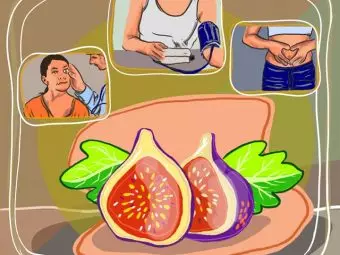 29 Amazing Benefits Of Figs For Skin, Hair And Health
29 Amazing Benefits Of Figs For Skin, Hair And Health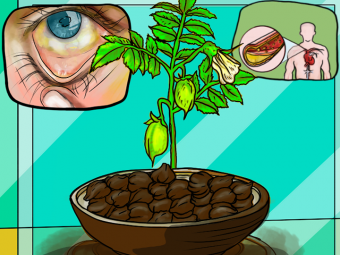 19 Amazing Benefits Of Black Chickpeas (Kala Chana) For Skin, Hair And Health
19 Amazing Benefits Of Black Chickpeas (Kala Chana) For Skin, Hair And Health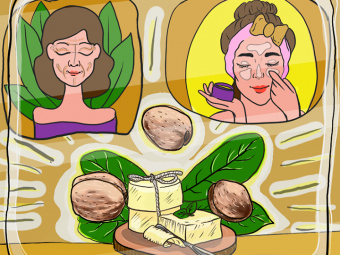 28 Best Shea Butter Benefits For Skin, Hair And Health
28 Best Shea Butter Benefits For Skin, Hair And Health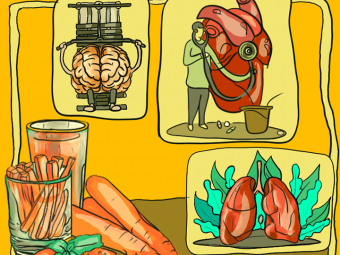 15 Best Benefits Of Beta Carotene For Skin, Hair And Health
15 Best Benefits Of Beta Carotene For Skin, Hair And Health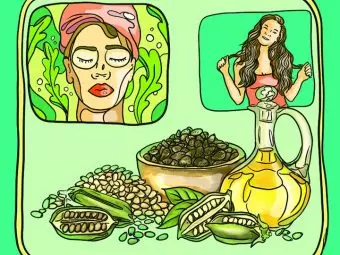 29 Amazing Benefits Of Sesame Seeds For Skin And Health
29 Amazing Benefits Of Sesame Seeds For Skin And Health 4 Reasons Goat Cheese Is Better Than Cow Cheese
4 Reasons Goat Cheese Is Better Than Cow Cheese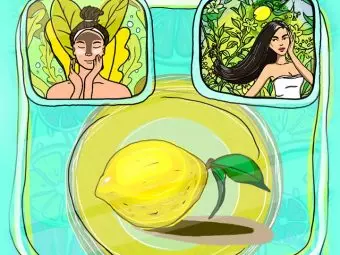 38 Benefits Of Lime For Skin, Hair, And Health + Nutrition
38 Benefits Of Lime For Skin, Hair, And Health + Nutrition Rice Water For Skin – How To Use It For Maximum Benefits
Rice Water For Skin – How To Use It For Maximum Benefits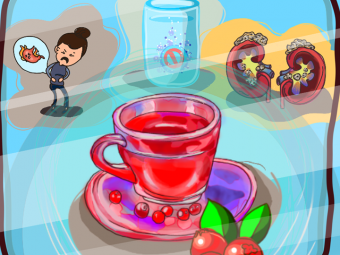 9 Benefits Of Cranberry Tea For Health And Recipes To Try
9 Benefits Of Cranberry Tea For Health And Recipes To Try